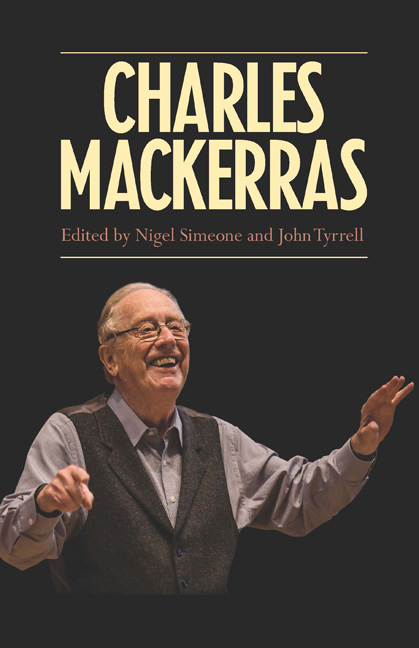Book contents
- Frontmatter
- Dedication
- Contents
- List of Illustrations
- List of Abbreviations
- Preface and Acknowledgments
- About the Contributors
- Charles Mackerras: A Chronology
- Prologue: A Eulogy for Charles
- 1 An Immense Stylist Evolves: 1947–87
- 2 A Personal Portrait of Charles Mackerras
- 3 Mackerras and Janáček
- 4 Goat's Milk in Vienna: Three Memorable Meetings
- 5 The Lion: Charles Mackerras
- 6 ‘The Musical Values of Opera’: WNO, 1987–92
- 7 Triumphs and Tribulations: Opera, 1993–2001
- 8 Rethinking Old Favourites: Opera, 2002–10
- 9 The Last Great ‘Czech’ Conductor
- 10 Reminiscences of a Friend and Colleague
- 11 Reconstructing a Better Version of The Greek Passion
- 12 Reconstructing Sullivan's Cello Concerto
- 13 Three Orchestras
- 14 Coda
- Appendix 1 Mackerras in Performance
- Appendix 2 Desert Island Lists
- Discography
- Bibliography
- Editions and Arrangements by Charles Mackerras
- Index
3 - Mackerras and Janáček
Published online by Cambridge University Press: 05 May 2015
- Frontmatter
- Dedication
- Contents
- List of Illustrations
- List of Abbreviations
- Preface and Acknowledgments
- About the Contributors
- Charles Mackerras: A Chronology
- Prologue: A Eulogy for Charles
- 1 An Immense Stylist Evolves: 1947–87
- 2 A Personal Portrait of Charles Mackerras
- 3 Mackerras and Janáček
- 4 Goat's Milk in Vienna: Three Memorable Meetings
- 5 The Lion: Charles Mackerras
- 6 ‘The Musical Values of Opera’: WNO, 1987–92
- 7 Triumphs and Tribulations: Opera, 1993–2001
- 8 Rethinking Old Favourites: Opera, 2002–10
- 9 The Last Great ‘Czech’ Conductor
- 10 Reminiscences of a Friend and Colleague
- 11 Reconstructing a Better Version of The Greek Passion
- 12 Reconstructing Sullivan's Cello Concerto
- 13 Three Orchestras
- 14 Coda
- Appendix 1 Mackerras in Performance
- Appendix 2 Desert Island Lists
- Discography
- Bibliography
- Editions and Arrangements by Charles Mackerras
- Index
Summary
‘If I'll be remembered for anything,’ Charles Mackerras once said, ‘it will be for Janáček.’ Readers of this book will be aware that Mackerras is remembered for much more, but in a sense he was right: other composers on which he particularly left his imprint, such as Handel, Mozart, Beethoven and Brahms, were well known long before Charles Mackerras came along. He simply found new ways of presenting them, making them sound different and thus contributing to a new perception of how music from the Baroque to the late Romantic period might be played to contemporary audiences. But for Janáček he was there from the beginning, at least outside the Czech and German lands. He conducted the first Janáček opera to be performed in Britain in 1951. Almost sixty years later he conducted a Janáček opera (The Cunning Little Vixen) just months before he died. In between he conducted Janáček all over the world and made many recordings. And during these sixty years Janáček turned from a unknown, cult composer making little impact on British opera audiences in early productions to one of the most frequently performed twentieth-century opera composers. This was largely the doing of Charles Mackerras and his well informed, passionate and persistent advocacy.
Discovery
Mackerras discovered Janáček in Prague in the autumn of 1947. With the war over, he had moved from his native Australia to work in London, where from May 1947 he had taken up a thirteen-week appointment as second oboe and repetiteur at the Sadler's Wells Opera Company. But his heart was set on conducting and he believed that he would get quicker and greater experience of opera conducting in particular if he spent a year abroad. Germany and Austria seemed the obvious places, but they were devastated by the war. A chance encounter with a Czech expatriate musician who observed Mackerras reading a Dvořák score (the Seventh Symphony, as it happened) suggested an alternative: Prague. Czechoslovakia, recently freed of Nazi rule and not yet having succumbed to Soviet rule, was comparatively unscathed by the Second World War and had managed to maintain concert and operatic activity, presided over by one of the great conductors of the twentieth century, Václav Talich.
- Type
- Chapter
- Information
- Charles Mackerras , pp. 45 - 60Publisher: Boydell & BrewerPrint publication year: 2015



